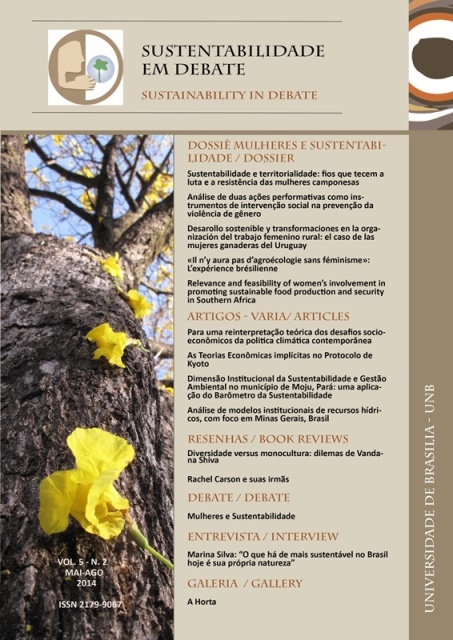Analyzing Institutional Models for Water Resources Management in Minas Gerais, Brazil
DOI:
https://doi.org/10.18472/SustDeb.v5n2.2014.10375Keywords:
Políticas Públicas, Gestão de Recursos Hídricos, Gestão Participativa, Gestão AmbientalAbstract
The paper proposes to develop a critical analysis of the main institutional models of water
management and how they were established over time by historical and environmental. Likewise,
the legal basis exists for the development of public policies related to water theme is quoted in
order to facilitate the understanding of the type of structure in the country for management. Be
on your format bureaucratic, economic, financial or participatory, institutionalization Brazilian
water resources currently aims to enable the interaction between their organizations toward a shared management of water, especially in a scenario of increasing participation and democratic
decision-making processes.
Downloads
References
do Rio das Velhas, Minas Gerais, 2001. Paper: Núcleo de Pesquisa em Políticas
Públicas (UnB). Janeiro, 2002.
AGENCIA NACIONAL DE ÁGUAS (ANA). Evolução da organização e implementação
da gestão de bacias no Brasil. Brasília: ANA. 2002.
_____. Geo Brasil: Recursos Hídricos: resumo executivo. Brasília/DF. 2007.
_____ . Conjuntura dos recursos hídricos no Brasil: informe 2012. Edição especial.
Brasília: ANA, 2009.
CAMARGOS, Luíza de Marillac Moreira. Plano diretor de recursos hídricos da
bacia hidrográfica do rio das Velhas: resumo executivo dezembro 2004/ Luíza de
Marillac Moreira Camargos (coord.). Belo Horizonte: Instituto Mineiro de Gestão
das Águas, Comitê da Bacia Hidrográfica do Rio das Velhas, 2005. 228 p.
CERH. Online. Disponível em http://www.conselhos.mg.gov.br/cerh/page/
institucional/competncias-224. Acesso em 22 nov. 2012.
ESMAN, Milton J.; UPHOFF, Norman T. Local Organizations ”“ intermediaries in
rural development. Londres. Cornell University, 1989.
FEAM. A questão ambiental em Minas Gerais: discurso e política. Belo Horizonte:
Fundação João Pinheiro, 1998.
INSTITUTO MINEIRO DE GESTÃO DAS ÁGUAS (IGAM), s.d. Online. Disponível em
<http://www.igam.mg.gov.br/> Acesso em 22 nov. 2012.
MINAS GERAIS. Lei nº 12.584, de 17 de julho de 1997. Altera a denominação do
Departamento de Recursos Hídricos do Estado de Minas Gerais - DRH - MG -, para
Instituto Mineiro de Gestão das Águas - IGAM, dispõe sobre sua reorganização e
dá outras providências. Diário do Executivo, Minas Gerais, 18/07/1997.
______________. Lei nº 13.199, de 29 de janeiro de 1999. Dispõe sobre a Política
Estadual de Recursos Hídricos e dá outras providências. Diário do Executivo, Minas
Gerais, 30/01/1999.
______________. Decreto nº 26.961, de 28 de abril de 1987. Cria o Conselho
Estadual de Recursos Hídricos, CERHI, Diário do Executivo, Minas Gerais, 29/04/
1987.
OSTRÖM, Elinor. Governing the commons. Nova York. Cambridge University Press.
1990.
PUTNAM, Robert D. How democracy works. Nova York: Cambridge University, 1998.
PORTO, Mônica F. A.; SILVA, R. T.; BRAGA, B.P.F. Water management in
Metropolitan São Paulo. In: Water Resources Development. Vol. 22; Nº 2, 337-
352. Junho, 2006.
SEPÚLVEDA, Rogério; LEMOS, Rodrigo; SPOSITO, Paola; THEODORO, Hildelano
Delanusse. Planejamento e gestão participativos: a metodologia para início da
aplicação dos recursos da cobrança pelo uso da água na bacia hidrográfica do
Rio das Velhas. XIV Congresso Mundial da Água. 2011.
THEODORO, Hildelano Delanusse. Instituições e gestão de recursos hídricos em
Minas Gerais. Dissertação de Mestrado. UFV, 2002.
___________________. Novas iniciativas na gestão dos recursos hídricos em
Minas Gerais. II Encontro Nacional da Anppas, Indaiatuba, São Paulo, Maio, 2004.
VELLOSO, T.R. A gestão dos recursos hídricos em um contexto regional: a
trajetória do Departamento Nacional de Obras Contra as Secas (DNOCS).
Dissertação (Mestrado em Extensão Rural). Universidade Federal de Viçosa. 2000.
Downloads
Published
How to Cite
Issue
Section
License
SUSTAINABILITY IN DEBATE – Copyright Statement
The submission of original scientific work(s) by the authors, as the copyright holders of the text(s) sent to the journal, under the terms of Law 9.610/98, implies in the concession of copyrights of printed and/or digital publication to the Sustainability in Debate Journal of the article(s) approved for publication purposes, in a single issue of the journal. Furthermore, approved scientific work(s) will be released without any charge, or any kind of copyright reimbursement, through the journal’s website, for reading, printing and/or downloading of the text file, from the date of acceptance for publication purposes. Therefore, the authors, when submitting the article (s) to the journal, and gratuitous assignment of copyrights related to the submitted scientific work, are fully aware that they will not be remunerated for the publication of the article(s) in the journal.
The Sustainability in Debate Journal is licensed under Creative Commons License – Non-Commercial-No-Derivation Attribution (Derivative Work Ban) 3.0 Brazil, aiming at dissemination of scientific knowledge, as indicated on the journal's website, which allows the text to be shared, and be recognized in regards to its authorship and original publication in this journal.
Authors are allowed to sign additional contracts separately, for non-exclusive distribution of the works published in the Sustainability in Debate Journal (for example, in a book chapter), provided that it is expressed the texts were originally published in this journal. Authors are allowed and encouraged to publish and distribute their text online, following publication in Sustainability in Debate (e.g. in institutional repositories or their personal pages). The authors expressly agree to the terms of this Copyright Statement, which will be applied following the submission and publishing by this journal.








